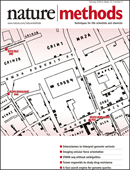Advertisement |
 |
Can you trust your Antibody? Implications for disease research.
A recent publication in Scientific Reports rigorously tested nine commercially available antibodies for specificity and sensitivity and found that only one, from Cell Signaling Technology, met all validation criteria. Read this open-access article to explore the potentially serious implications of non-specific antibodies and disease research.
Read more now. | | | |
 |
 |
TABLE OF CONTENTS
|
| February 2018 Volume 15, Issue 2 |
 |  |  |
 |  Editorial Editorial
 This Month This Month
 Research Highlights Research Highlights
 Technology Feature Technology Feature
 Resource Resource
 Brief Communications Brief Communications
 Articles Articles
 Application Note Application Note
|  | Advertisement |  |  |  | 
NSK Manipulation System
Simplify and automate your micromanipulator workflow.
Easy-to-use, PC-based system enables inexperienced operators to perform high-skill tasks, and automation reduces repetition and increases efficiency. Proprietary piezo-actuator enables highly accurate cell perforation with minimal damage. Ideal for ICSI, DNA injection, and research applications. | | |
| |
 |
| |
 |
 |
Advertisement |
 |
All of your valuable samples deserve the best treatment.
With continuous quality assurance throughout the entire production process, you are guaranteed the highest quality consumables for ultimate reliability and reproducibility of your precious experiments. Eppendorf consumables — quality beyond measure. |  | | |
 |
| |
| Advertisement |
 |
| |
 |
| |
Editorial |  Top Top |
 |
 |
 |
| The good referee p91
doi:10.1038/nmeth.4603
Referees provide an invaluable service in advancing science. We offer some food for thought about how to effectively peer review methods papers.
|
 |
This Month |  Top Top |
 |
 |
 |
| The Author File: Jennifer Phillips-Cremins p93
Vivien Marx
doi:10.1038/nmeth.4584
To better explore how genomes fold takes disparate fields and a love of math.
|
 |
Research Highlights |  Top Top |
 |
 |
 |
| |
 |
Technology Feature |  Top Top |
 |
 |
 |
| Meet some code-breakers of noncoding RNAs pp103 - 106
Vivien Marx
doi:10.1038/nmeth.4594
The regulome—the part of the genome that regulates function—includes noncoding RNAs with varied functions yet to be deciphered.
|
 |
Resource |  Top Top |
 |
 |
 |
| Interactome INSIDER: a structural interactome browser for genomic studies pp107 - 114
Michael J Meyer, Juan Felipe Beltrán, Siqi Liang, Robert Fragoza, Aaron Rumack et al.
doi:10.1038/nmeth.4540
Based on machine learning-predicted interaction interfaces, this resource enables interpretation of genomic variants and disease mutations in light of the protein-protein interactome.
|
 |
Brief Communications |  Top Top |
 |
 |
 |
| Mapping the 3D orientation of piconewton integrin traction forces pp115 - 118
Joshua M Brockman, Aaron T Blanchard, Victor Pui-Yan Ma, Wallace D Derricotte, Yun Zhang et al.
doi:10.1038/nmeth.4536
Molecular force microscopy employs a combination of fluorescence polarization microscopy and molecular tension sensors to determine the orientation of cellular forces. The technology is demonstrated for integrin-mediated forces in platelets and fibroblasts.
|
 |
 |
 |
| Detecting hierarchical genome folding with network modularity pp119 - 122
Heidi K Norton, Daniel J Emerson, Harvey Huang, Jesi Kim, Katelyn R Titus et al.
doi:10.1038/nmeth.4560
3DNetMod identifies nested topologically associating domains (TADs) and subTADs from Hi-C data.
|
 |
 |
 |
| GIGGLE: a search engine for large-scale integrated genome analysis pp123 - 126
Ryan M Layer, Brent S Pedersen, Tonya DiSera, Gabor T Marth, Jason Gertz et al.
doi:10.1038/nmeth.4556
GIGGLE is a genome interval search engine that enables extremely fast queries of genome features from thousands of genome annotation sets.
|
 |
Articles |  Top Top |
 |
 |
 |
| Biotinylation by antibody recognition—a method for proximity labeling pp127 - 133
Daniel Z Bar, Kathleen Atkatsh, Urraca Tavarez, Michael R Erdos, Yosef Gruenbaum et al.
doi:10.1038/nmeth.4533
Proximity-based labeling represents a useful approach for mapping protein environment, but current methods for this are limited to application to cell lines. This approach is now extended to primary human tissues with a method that uses antibodies to guide proximity labeling.
|
 |
 |
 |
| BRCA-deficient mouse mammary tumor organoids to study cancer-drug resistance pp134 - 140
Alexandra A Duarte, Ewa Gogola, Norman Sachs, Marco Barazas, Stefano Annunziato et al.
doi:10.1038/nmeth.4535
Mouse tumor organoids are characterized as a model to study tumor biology and drug resistance.
|
 |
 |
 |
| Resolving systematic errors in widely used enhancer activity assays in human cells pp141 - 149
Felix Muerdter, Łukasz M Boryń, Ashley R Woodfin, Christoph Neumayr, Martina Rath et al.
doi:10.1038/nmeth.4534
Using the ORI of plasmids used in enhancer assays as the sole core promoter and inhibiting the interferon I response triggered by plasmid transfection greatly reduces false positive and negative results in single-candidate and massively parallel enhancer assays and enables genome-wide enhancer screens.
|
 |
| Advertisement |
 |
| |
 |
| |
Application Note |  Top Top |
 |
 |
 |
| Making difficult things easier and simpler with a manipulation system
|
 |
 Top Top |
 |
 |
| Advertisement |
 |
| |
 |
| |
 |  |  |  |  |  | Natureevents is a fully searchable, multi-disciplinary database designed to maximise exposure for events organisers. The contents of the Natureevents Directory are now live. The digital version is available here.
Find the latest scientific conferences, courses, meetings and symposia on natureevents.com. For event advertising opportunities across the Nature Publishing Group portfolio please contact natureevents@nature.com |  |  |  |  |  | |
 |


No comments:
Post a Comment